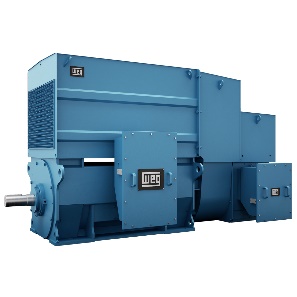Technical Features:
|
Output |
: |
up to 50.000 kW |
|
Poles |
: |
2 to 14 |
|
Frame |
: |
355 up to 1.800 |
|
Voltage |
: |
up to 13.800 V |
|
Frequency |
: |
50 or 60 Hz |
|
Enclosure |
: |
IC611, IC616, IC666, IC81W, IC86W |
|
Insulation Class |
: |
F |
|
Temperature Rise |
: |
B (80K) |
|
Ambient Temperature |
: |
-20˚ C to +40˚ C at 1000m.a.s.l. |
|
Frame Material |
: |
Welded Steel Plate or Cast iron |
|
Starting Method |
: |
Liquid Starter |
|
Thermal Protection |
: |
RTD PT-100 – two per phase |
|
: |
RTD PT-100 – one per bearing |
|
|
Anti Condensation |
: |
Space Heater |
|
Rotor |
: |
Wound with collector ring |
|
Construction |
: |
Horizontal / Vertical |
|
Standard |
: |
IEC / NEMA / NBR |
|
Bearing |
: |
Antifriction or sleeve bearing |
|
Brush holder |
: |
With motorized and manual brush lifting system |
|
Manufacturing Site |
: |
WEG Energy (Brazil, India, China, Portugal) |
|
Other features |
: |
On request |
|
Advantages: |
|
Motorized brush lifting implies important advantages in the performance of the motor throughout the years: Avoids constant and premature wearing of the brushes and collector rings Reduce the stop for maintenance ad replacement of brushes Avoids the accumulation of dust on the brushes inside the brush compartment to keeping the insulation level of the rotor high Increase the useful life of the brushes, collector ring and consequently that of the motor |

